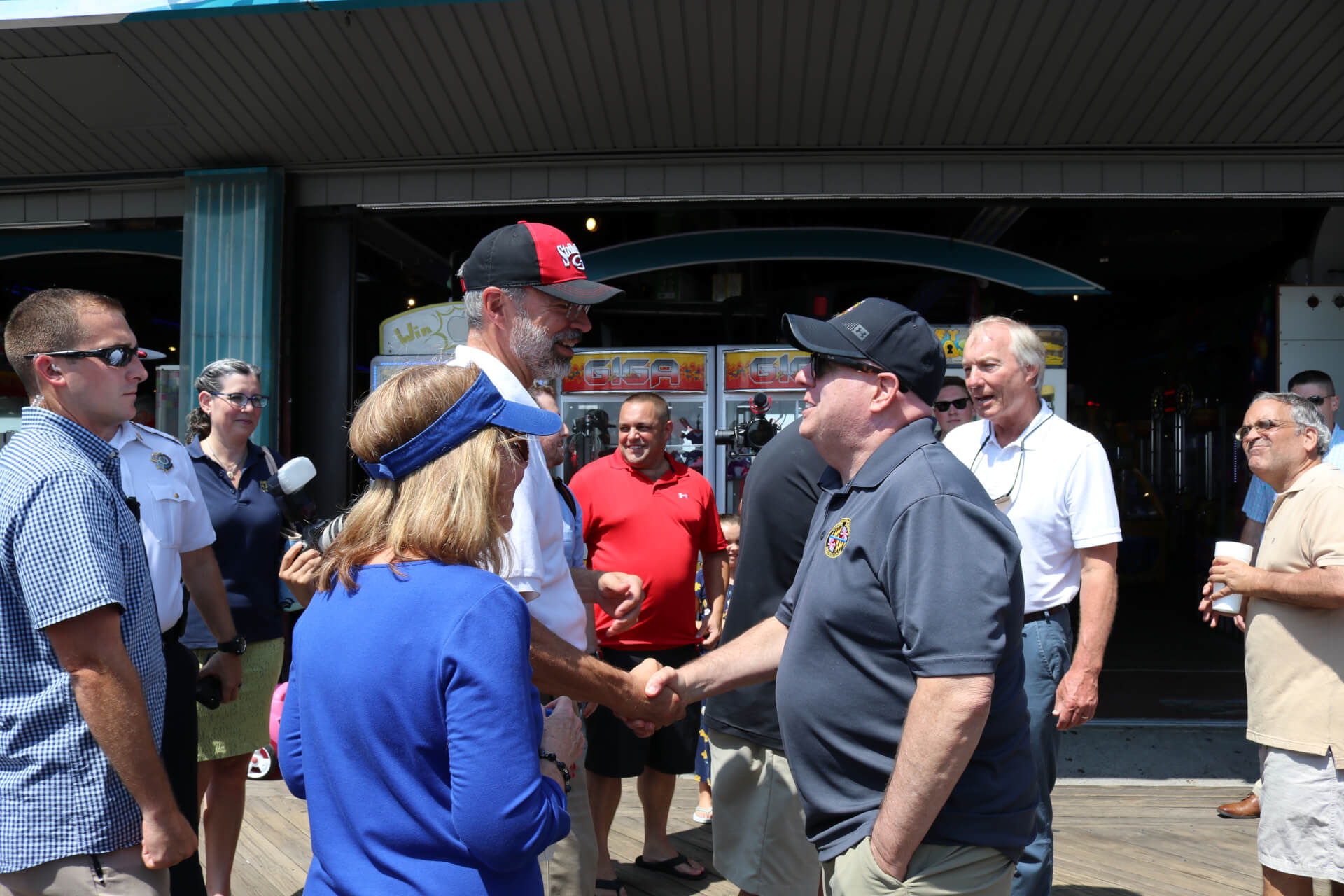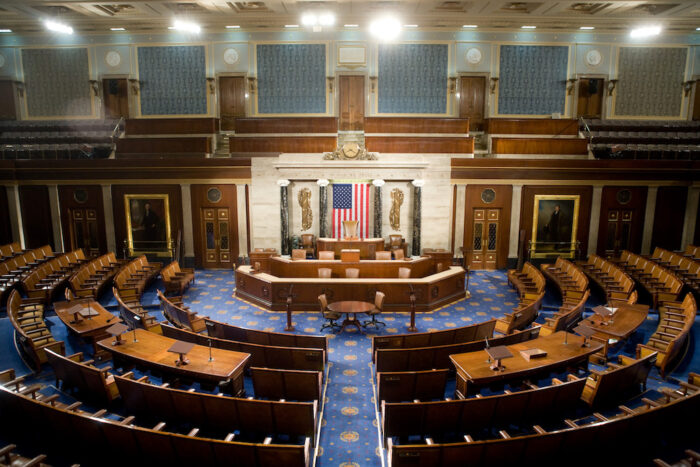Rep. Harris Blasts Relief Package, Says U.S. Will ‘Learn A Lot’ From COVID-19

As the COVID-19 pandemic sinks its teeth into the U.S., policymakers are looking for ways to stop their constituents from being ravaged by both the disease and its economic fallout.
Last week federal lawmakers passed a $2.2 trillion COVID-19 aid package, accounting for $100 billion in hospital bailouts, increased federal unemployment insurance and aid for nationwide commercial and nonprofit businesses.
A doctor and tenured politician, U.S. Rep. Andrew P. Harris (R-Md.) was a vocal critic of the multi-trillion dollar measure, which he said will only pull the country through for about two months.
Notably, the congressman cited the need for single-issue bailout bills, questioning the necessity of a number of add-ons in the funding measure — and their price tag.
“As I sit on the floor of the House today listening to colleague after colleague say ‘this bill is not perfect’ and ‘I’ll support this bill because of the crisis, but it has many flaws’ — I again urge my colleagues to consider #singleissuebills for all future legislation,” he tweeted. “…and especially for legislation in crisis. We need to learn to #skipthepork and stop using a crisis for pet projects that we can’t get passed otherwise.”
Harris told Maryland Matters in an interview this week that he supported the first two rounds of relief legislation earlier in March, but rejected the third passed last Friday because some of its provisions would ultimately have a negative economic impact.
“I thought that some of the policy measures would harm some of the small businesses,” he said, “especially after the first time in the country’s history, you know, we will pay people more not to work … than they would have earned at their job.”
A worker earning the federal minimum wage over a 40-hour workweek makes $300.
The Washington Post reported last week that the bill is set to add a supplemental $600 onto current federal unemployment benefits for a period of four months. The current average amount of benefits paid out rests around $300 a week.
“Had that not been in the bill, I would have voted for the bill,” Harris said. “But I think that’s such a bad precedent policy because we don’t know how long this is going to last and to, to set that precedent of paying people more not to work than to work is not a good idea.”
Harris is not only the sole Republican in the Maryland congressional delegation but also the only physician. He has repeatedly expressed appreciation for health care workers online in recent days.
He called the most recent bill unfair to medical professionals on the frontlines of the pandemic, saying they are being asked to work under dangerous conditions for no extra money.
“And how can we justify that when we pay someone who’s unemployed more than they … got paid when they worked?”
The economy has already taken a huge hit since the virus’ spread to the U.S., and Maryland is feeling the heat. Two weeks ago, over 42,000 residents applied for unemployment insurance in a single week. Updated figures for last week will be released Thursday morning.
Harris believes that despite the blows, the economy will return to business as usual “very, very quickly” when the worst of COVID-19 passes.
“We are the strongest economy in the world and after we bounce back, we will probably continue to be the strongest economy in the world,” he said.
‘These decisions are best made at the local level’
In the meantime, Harris said U.S. scientists are working on vaccines that other nations will come to rely on, citing nations in Africa, which Harris says have yet to see an “upswing” in coronavirus cases.
During the interview, Harris applauded the Trump administration’s decision to cease travel with China in February, noting that countries like South Korea and Italy that failed to do so “had their peaks earlier than we did.”
He also commended the decision not to federally mandate shelter-in-place procedures across the country, because “the solution for … New York City would probably be very different from the solution for South Dakota.”
“These decisions are best made at the local level where people on the ground know what resources they … have, they’re tracking closely how the disease is spreading, and they know best what measures to take,” he said.
Harris called the public health crisis “the tale of two different pandemics:” the raging health care battle taking place in urban centers vs. the virus’ limited penetration of rural areas, which he said have been “relatively spared.”
“That’s what you see nationwide: You see that the urban areas and the areas where people live closer together, you know, have much higher case rates,” he said.
Harris suggested that rings true in Maryland as well.
Because Maryland’s shore counties are less populated, Harris said he thinks they may fare better during the pandemic, and that Gov. Lawrence J. Hogan Jr.’s (R) Monday decision to issue a stay at home directive will have a bigger impact on higher-population areas like Prince George’s County.
“I think the Eastern Shore may be spared a lot of the cases that are going to develop in the Baltimore-Washington area,” he said.
As of Wednesday afternoon, Harris’ district has 49 confirmed cases of COVID-19 across eight counties — just 2% of the state’s total.
But Eastern Shore officials have taken a number of steps in recent days to limit exposures. On Monday, Ocean City Mayor Rick Meehan announced the month-long closure of the beach, boardwalk and inlet, followed by a shutdown of the resort town’s hotels and short-term rental properties on Tuesday.
Harris said that while this is a local official’s game, the federal government has a role in ensuring that aid gets to U.S. epicenters — acting as a “clearinghouse for supplies.”
Reserves to test for and combat the virus are in high demand across the country, with governors looking to the Strategic National Stockpile to bridge the gaps.
The stockpile is a depot of pharmaceutical and medical supplies intended to be used to supplement local shortages during public health emergencies like disease outbreaks and national disasters.
The Washington Post reported that after deploying millions of masks, gloves and N95 respirators during the H1N1 pandemic of 2009, the National Strategic Stockpile was never adequately replenished.
Harris said that the key to solving problems within the supply chain surrounding tests and other equipment lies in flattening the curve.
The inability to access widespread COVID-19 testing across state lines has posed a number of problems in diagnosing patients who fear they may have been exposed or are exhibiting symptoms.
FDA officials announced Monday that they are hastening the review process of COVID-19 diagnostic tests developed by U.S. companies.
Harris said that with the advent of rapid, accurate testing will come the government’s ability to track the progression of the disease, allowing officials to make “predictions” about where the greatest need for supplies — like ventilators and gloves — will lie.
Not the last pandemic
According to Harris, the U.S. is going to learn a lot from how it handles this pandemic — not just about stockpiling but about increasing the speed of production during times of crisis and keeping key elements of the supply chain on U.S. soil.
He predicted this will not be the last virus to reach the classification of “pandemic” worldwide.
“I think that we have two dangers: One is from naturally occurring viruses,” Harris said. “The other danger that I think we’re going to face and we have to proactively work to counter that is … bioweapons.”
The congressman explained that as it becomes easier to genetically manipulate viruses, the more likely it is that “bad actors” will implement them in acts of biowarfare.
“I think that we’re going to learn a lot from this naturally occurring virus, but some of the principles we’re going to put in place will be very important as the protection of the American public from potential use of bioweapons in the future,” he said.
A NOTE TO OUR READERS
In these uncertain times, we’re here for you. We have a page dedicated to our reporting on COVID-19 in Maryland. We’ll continue to report with an eye toward the humanity of our sources and a commitment to public accountability.
Stay informed by signing up for the Maryland Matters Memo — our daily morning news roundup, delivered to your inbox. Free.
And if you are able, please consider a tax-deductible contribution to support our nonprofit newsroom.
We’re burning the candle at both ends — doing all we can to keep ourselves, and everyone else, as safe as possible — as we keep you informed.
Please take care!




 Creative Commons Attribution
Creative Commons Attribution